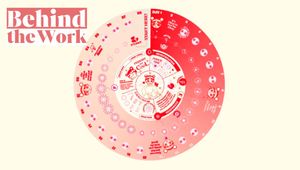
Bossing It: Why Culture Is Key to Growth with Marcela Jiménez

Marcela Jiménez has worked on and off with the WPP family for over 21 years and in a leading position for 17. She has had the opportunity to work with multinational accounts such as Johnson & Johnson, Reckitt & Benckiser, General Foods, Beiersdorf and since 2005 with Colgate. Currently manages the VMLY&R COMMERCE | Geometry office in Cali.
Marcela considers herself, mostly, a team builder and for the past years consolidated the LATAM shopper team working with WPP at CP and expanded full agency services to attend local hubs for Colgate Andina, Greater Caribbean and Central America region in a truly partnership with our clients, listening to their needs and offering specific solutions.
First a mother of two great young ladies, now an empty nester and a nature lover. Enjoy reading, drawing and everything to do with aesthetics, architecture, home décor, flower arrangements, use of colour and patterns.
LBB> What was your first experience of leadership?
Marcela> It came with a promotion in 2006, becoming a regional account director, leading an entire team of around 35 people for one of our main international clients. It happened suddenly and unexpectedly. I just had returned to the workplace after a break I had made to be a mom for a second time and with only two years being back to the workforce. It was my first appreciation of how things change in just a couple of years, especially in our industry.
LBB> How did you figure out what kind of leader you wanted to be – or what kind of leader you didn’t want to be?
Marcela> Fortunately, I had moved around enough to have different experience types of leadership and starting from the bottom up with small local agencies and progressing to bigger ones, made me appreciate that teamwork is always a key to better work. When you work for a small company, there are not enough resources, so unify forces, collaboration and doing things that are not even in your job description, allowing a better understanding of other’s work and how to integrate more areas. So, understanding people’s roles and the work they do is important.
Also, understanding people’s motivations and creating a healthy work environment helps to unleash their potential. It is important for a person to feel welcome at their workplace, to feel supported. I had some rough experiences with a boss that thought power or respect had to come with fear, and I knew I would never want to be like that. Everyone knows that nobody thinks straight when they are in fear. To lead is to lead by example, to listen to others so you can get out of your own perceptions and to always act according to what is best for them and the company.
LBB> What experience or moment gave you your biggest lesson in leadership?
Marcela> I couldn´t get around the pandemic, it was a big lesson that as a leader I am still learning. To look at how our own leaders handle the situation, not only at that moment but still years after, made us think more about what is important to have in our work culture and what do I need to build within the team to prepare them for the future. The fact that with this disruption our team stock together and even managed to grow the business was something admirable. So, looking into the values that allow that to happen was important and, I also learned we need to prepare for them better, knowing that uncertainty is our reality and that the world really changed and it is moving at a faster pace than before. That made me rethink many decisions, not only about the workplace but about the way of work and what skills are needed to face new challenges.
LBB> Did you know you always wanted to take on a leadership role? If so, how did you work towards it and if not, when did you start realising that you had it in you?
Marcela> To be honest, I never thought myself as a leader. I don’t know if it is because when I was growing up women in our society didn't have many significant leadership roles and we were not encouraged to seek those positions. Things have changed through the years, but I still think we are not doing enough to raise the confidence in girls to lead, to have self-worth. It is ironic that my personal life was key to unleash my confidence. I got divorced when my kids were very young, five and nine years old, both girls, and something clicked in me. Besides providing for them, I knew I had to show them the way to change the paradigm by which we were raised. At first it wasn't intentional but as time passed, I realised how important it is to think about the role you are in and how it can help to shape other people's lives, I tried to do a more conscious job, and still is a work in progress, you fail, you learn and you keep putting the work.
LBB> When it comes to 'leadership' as a skill, how much do you think is a natural part of personality, how much can be taught and learned?
Marcela> For some people it can become more natural than others, but still, I believe is not a trace in personality and more about personal experiences, so definitely leadership is something that can be learned, through life but also through academic 'shortcuts' like any other disciple. But what makes a good leader is, definitely, the ability to listen, be curious and have empathy.
LBB> What are the aspects of leadership that you find most personally challenging? And how do you work through them?
Marcela> Being a female leader for me has been a challenge. Ours is still a male driven society and the way they perceive female leadership vs male has different standards. When you are a female leader that allows participation, some people may confuse that with lack of authority and will try to overpass you in ways that they wouldn’t do to a male leader. Sometimes you´ve got to be tough and create boundaries.
LBB> Have you ever felt like you've failed whilst in charge? How did you address the issue and what did you learn from it?
Marcela> Many times, during my 17 years leading the team, I have felt a sense of failure or impotence towards the many changes our team had to face over the years. Some within the company, others due to the natural changes and evolutions within our discipline that requires transformations that sometimes are painful. And I learned, firstly to not enter in despair, take one issue at a time; reach out to other people in the organisation that can give you a fresh perspective and prepare for change, embrace it, work with it because, at the end, that is growth.
LBB> In terms of leadership and openness, what’s your approach there? Do you think it’s important to be transparent as possible in the service of being authentic? Or is there a value in being careful and considered?
Marcela> I believe in transparency in a sense of being clear and open on what to expect from you and you from your team, that is important, but also you need to be careful with what you say, and how you behave. At the end you are a company leader and that requires a certain degree of discretion. You are dealing with human emotions, with business challenges, goals, and so you need to be thinking about how to best manoeuvre the situations to get the objectives the company has set up to achieve.
LBB> As you developed your leadership skills did you have a mentor, if so, who were/are they and what have you learned? And on the flip side, do you mentor any aspiring leaders and how do you approach that relationship?
Marcela> My mentoring came a bit late, but still grateful to have had it. Only until recently, I had a boss who really made an impact on coaching me and it was enlightening. It helped me look at some situations with a more detached approach, to analyse deeper before reacting. That is something that takes practice. He really showed me different ways to solve different problems. About me mentoring future leaders, yes, I have identified possible leaders and tried to have them work by my side, it is a constructive approach more than a directional one. I still don't feel I am an expert, by no means, but if I can show them some ropes, with an honest interaction, my hope is that they will someday take the lead.
LBB> In continually changing market circumstances, how do you cope with the responsibility of leading a team through difficult waters?
Marcela> Change is a constant in our workspace. It is not a new concept for our organisation and certainly not for my team, we have faced difficult waters more often than expected. I believe I have a resilient team but, needless to say, it can be overwhelming at times. So, in difficult times you must become aware that you need to run a tighter ship; work closer together, evaluate the changes to be made and adjust. To seek different perspectives is also very helpful. For this reason, having other people who know the business and seek the same interest is important. For example, I run an international business and have colleges all over Latin-American, so building a net of close partners that can bring that fresh perspective.
On a more personal note, I also seek space to be in nature to lower the adrenaline and find a good book to bury my thoughts when they don´t let my mind settle. Finding spaces to breathe and collect is key to facing a difficult situation.
LBB> As a leader, what are some of the ways in which you’ve prioritised diversity and inclusion within your workforce?
Marcela> When we talk about inclusion and diversity, we tend to narrow down the description to gender, race or self-identity, and that is very important and we should seek diversity because that brings different perspectives that not only contributes to elevate our work but humanises the work environment; but also, there is something that is equally special if you work in a third world country. It is seeking for talent beyond the 'Ivy league schools', or Top schools, because in a place where education is highly unequal, you have to be aware that talent can be found in a non-traditional way, so the recruitment we do, especially for creatives, has to have a different focus, this way what really matters is the talent and the willingness to keep learning.
LBB> How important is your company culture to the success of your business? And how have you managed to keep it alive with increases in remote and hybrid working patterns?
Marcela> For me culture is key not only to survival but to growth. If I look back to these 17 years leading the team, what made us stronger, and helped us through multiples changes and allowed us to grow organically, has to do with our team´s culture of collaborative and support among each other. That is something I appreciate because when you have this teamwork culture, you are a solution seeker organisation and you don’t get caught up on the problem, as a group you always find ways to fix it. Agencies are problem solvers, and if you understand the potential that is to be able to work with a selfless mentality, the opportunities for growth are endless. We are still in a more stay home workplace just because we are in the middle of changing what we had as an office, to one that adapts better for the future, and I recognised it has been very hard for our company culture to have its people remote. You can't really build community without human contact. We are moving towards the hybrid model, and it will also have its challenges. But I do believe is a fair way for people and the company to have a better balance, specially with the challenges in mobility that our cities face.
LBB> What are the most useful resources you’ve found to help you along your leadership journey?
Marcela> One of the resources that I most value was the WPP Walk the Talk championing diversity and supporting women leadership. To get to share some time with very talented women leaders, talk to them and discover that you share some of the mostly common fears, gave me the reassurance I needed. Knowing that this is a path that we are building, that there is no perfection or a right or wrong approach. As long as you listen to your people, work for their wellbeing and help them to achieve their potential.













